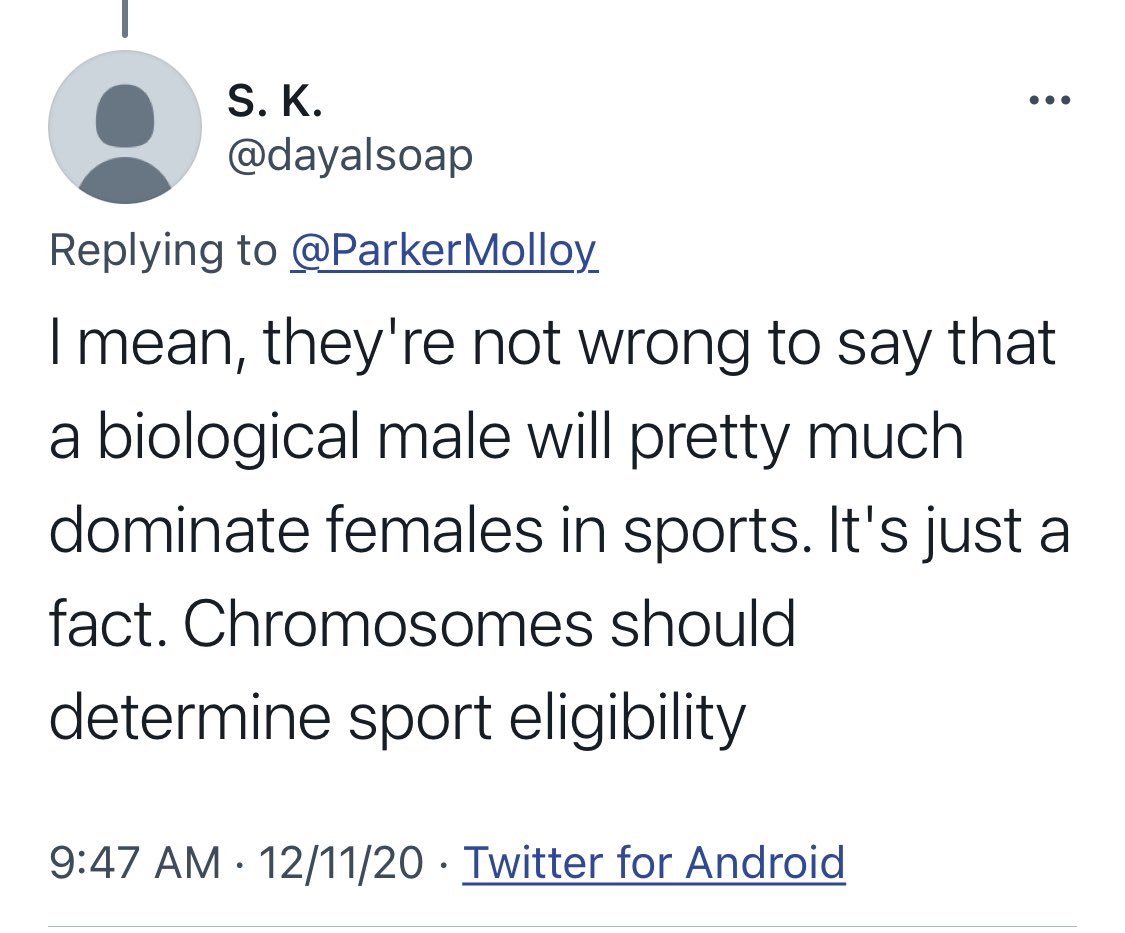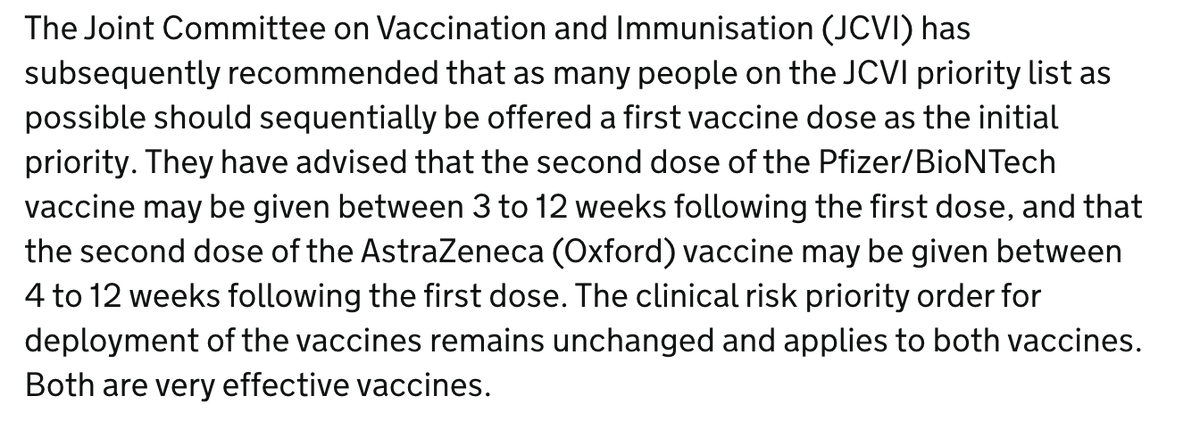I’m here to provide a very unsatisfying answer: It depends.
There are a number of reasons bills like these are wrongheaded. One is that it tries to implement the same kind of one-size-fits-all solution that opponents of trans inclusion claim to oppose.
But let’s get nuanced for a minute...
NEW: Hawaii Rep. @TulsiGabbard introduces bill called \u2018Protect Women\u2019s Sports Act\u2019 \u2014 would clarify Title IX protections to be based on biological sex, which would impact transgender athletes participating in athletic programs for women and girls @KITV4 pic.twitter.com/VcDDgO1mFL
— Tom George (@TheTomGeorge) December 10, 2020
I’m here to provide a very unsatisfying answer: It depends.
How old are people competing in it?
What sort of hormone treatment has the person in question had and for how long?
Those are all factors that play into the fairness question.
Take the case of Mack Beggs.
A few years back, Beggs was a high school student in Texas. He was a wrestler, and wanted to do it at the college level.
He wanted to wrestle. Specifically, he wanted a spot on his school’s boys team.
He wasn’t allowed.
Now, here’s where you might go “wait, wait, isn’t it unfair for someone taking testosterone to wrestle girls?” and the answer is yeah, it is.
1. Don’t wrestle at all
2. Wrestle against girls, keep taking testosterone, have an advantage
3. Wrestle against girls, stop taking testosterone even though it’s something he, his family, his doctor see as necessary
But he couldn’t. Because of a blanket rule meant to ensure “fairness.”
He dominated. Obviously. He won the state championship twice in a division he never wanted to compete in in the first place.
And yes, it was. But it wasn’t his fault. It was an anti-trans rule meant to ensure “fairness” that caused the unfairness.
Here’s a story about him from this year. He’s in college now:
https://t.co/sAdkUN6SgC
Do trans women and girls have an advantage in sports over other women and girls?
— Parker Molloy (@ParkerMolloy) December 11, 2020
I\u2019m here to provide a very unsatisfying answer: It depends.
It’s a topic that often gets looked at with zero nuance. Bills like Gabbard’s in the House or Loeffler’s in the Senate look to codify zero nuance.
Look, here’s a 1976 letter to the editor sent to NYT: “women’s sports will be taken over by a giant race of surgically created women.”
44 years ago!
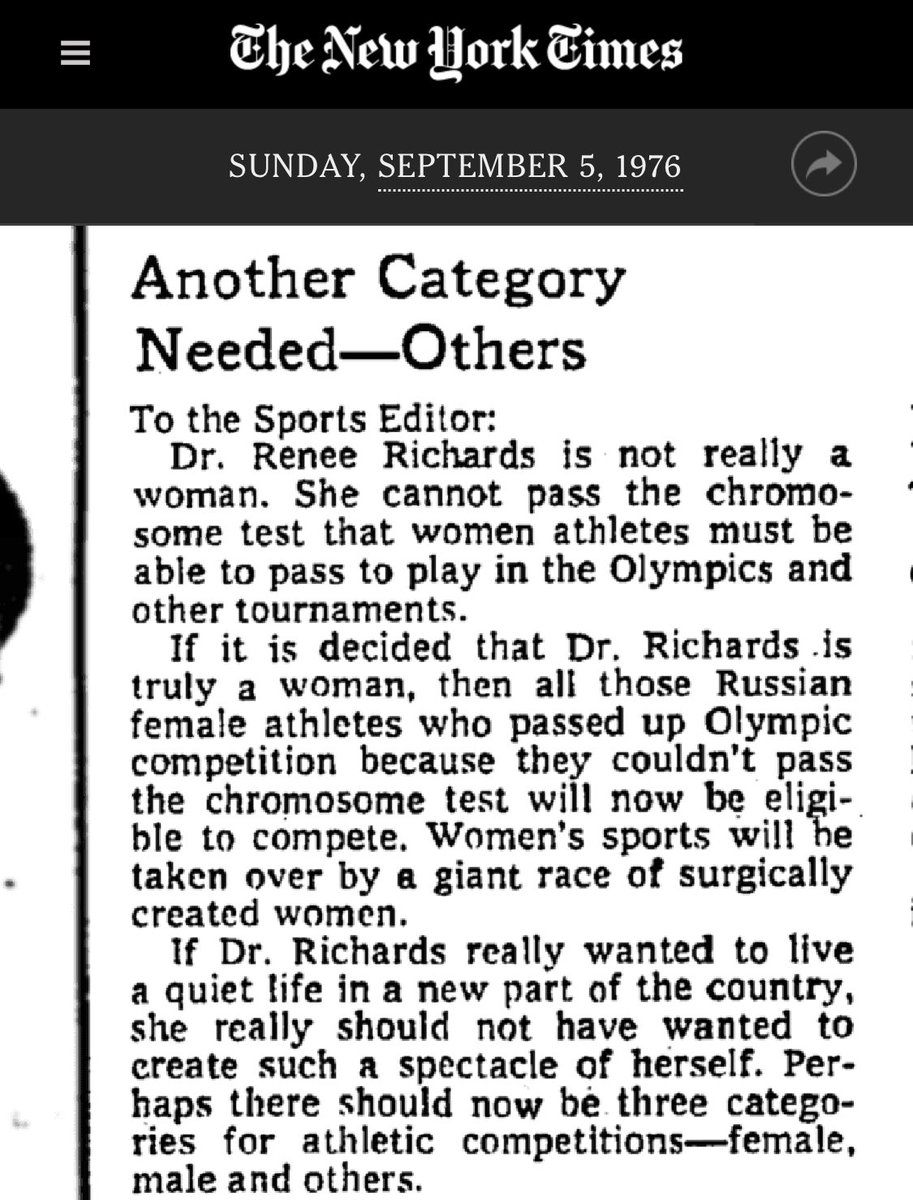
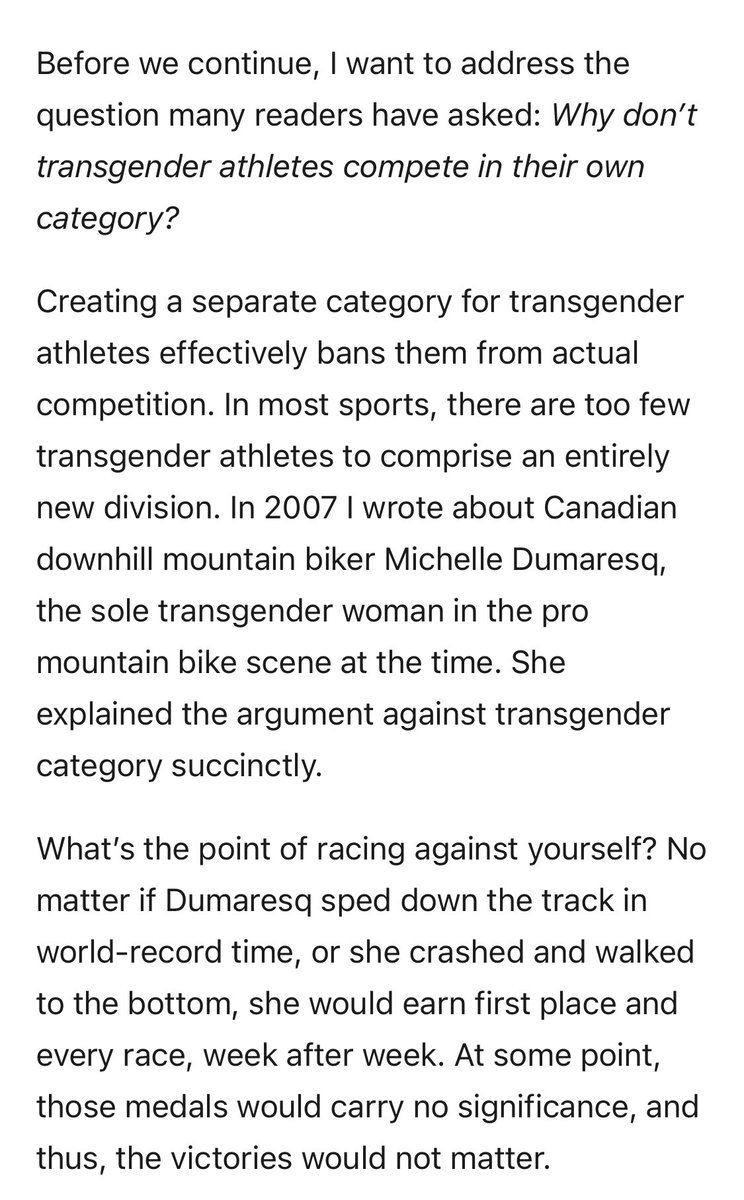
But, as I’ve said before: this isn’t actually about sports.
Something I wrote for Vice in 2014: https://t.co/VsFjdDRtwn
More from Parker Molloy
Communists bloggers like @mmfa run the same playbook of lies and smears on people they feel threatened by.
— Marjorie Taylor Greene \U0001f1fa\U0001f1f8 (@mtgreenee) January 21, 2021
Produce fake news, spread it all around, then tag all fake news stories about their victim in all future stories.
Guess what?
Nobody cares about your BS.
Anyway, here are some of the "communist" blog posts about the Qongresswoman from Georgia (thread)
In 2018, she agreed with someone who said that 9/11 was an inside job and argued that the school shooting in Parkland, FL was a false flag.
And then there's another time she said that the Parkland shooting was fake
She claimed that there was "never any evidence" that a plane was flown into the Pentagon on 9/11
The tl;dr is that for years right-wing media have been excusing Trump's violent rhetoric by going, "Yes, but THE DEMOCRATS..." and then bending themselves into knots to pretend that Dems were calling for violence when they very, very clearly weren't.
And in fact, this predates Trump.
In 2008, Obama was talking about not backing down in the face of an ugly campaign. He said "If they bring a knife to the fight, we bring a gun."
https://t.co/i5YaQJsKop

That quote was from the movie The Untouchables. And there's no way anybody reading that quote in good faith could conclude that he was talking about actual guns and knives. But it became a big talking point on the
In 2018, Obama-era Attorney General Eric Holder was speaking to a group of Georgia Democrats about GOP voter suppression. He riffed on Michelle Obama's "When they go low, we go high" line from the 2016 DNC.
She thinks the election was stolen from Donald Trump. He believes what dozens of courts and officials have found: that Joe Biden is the rightful winner. They're trying to find common ground but wonder whether they \u2013 and the nation \u2013 can do it. https://t.co/oM5XrAevkl
— The Associated Press (@AP) January 24, 2021
Look at this. This treats both views as legitimate. Fucking garbage.
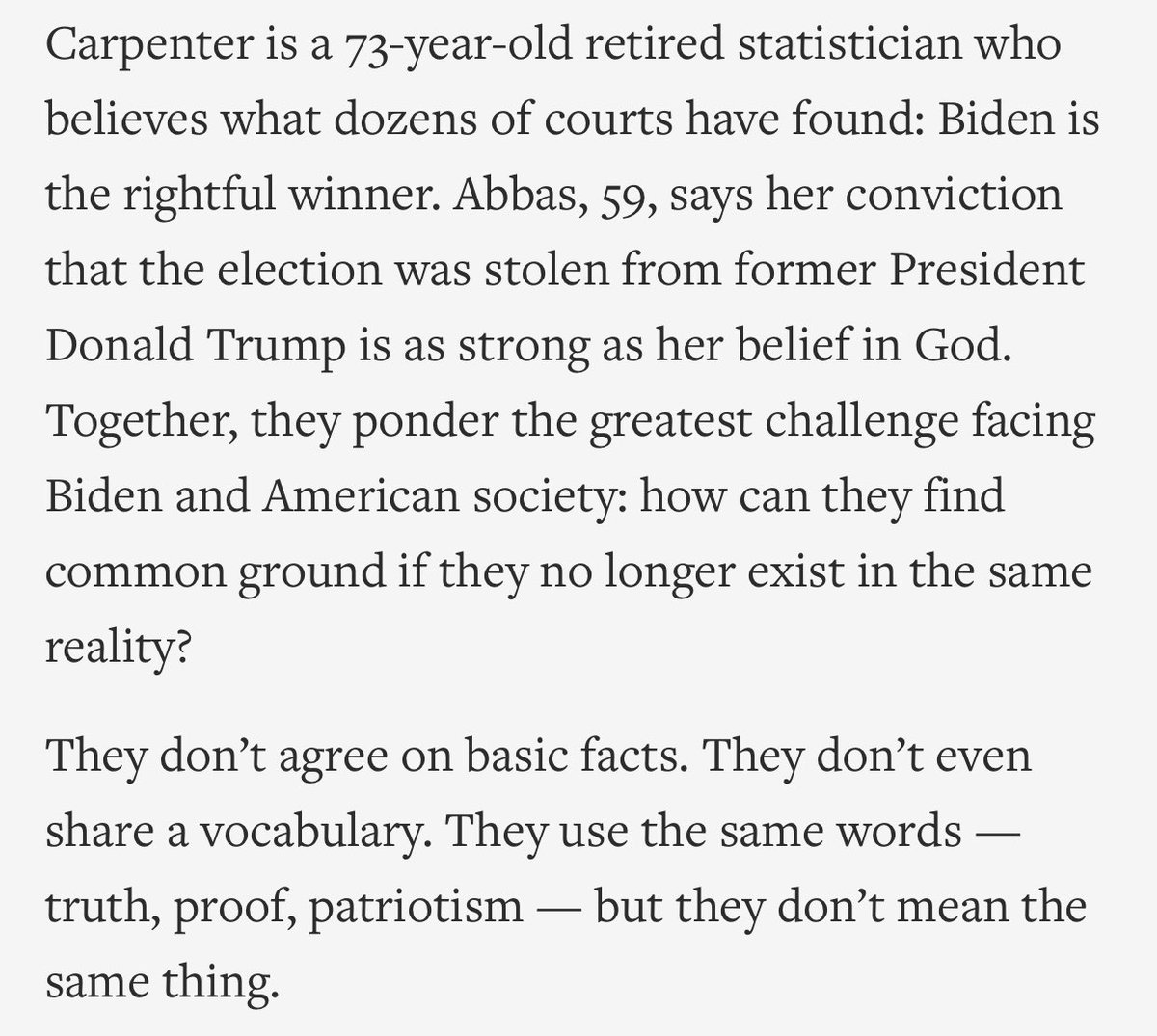
Have you learned nothing?! This is such bullshit. Why the fuck do I even bother trying to push back on bad journalism? No one in positions of power ever listen.
I used to think that bad journalism was mostly the result of honest mistakes, but the past few years have really hammered home for me how much it is intentional trash. Shame on @AP for that bullshit. Shame on @ABC for letting Rand Paul rant about his election conspiracy theories.
Seriously, @AP @ClaireGalofaro @JulietLinderman? You didn’t even bother to note that this lady’s delusions are false.
More from Government
Biden says "small classes". What we need to understand is how they plant to accomplish this.
Through "childcare programs in schools". We see this all over states w/ closed schools.
Today, our first working day, @JoeBiden signed an Executive Order on safely reopening childcare programs in schools - @DrBiden pic.twitter.com/J4vZk5ZAaS
— AFT (@AFTunion) January 21, 2021
We need to grasp that the AFT, NEA, & local unions are systematically working to decouple education from childcare.
Their vision is your child sitting on a device all day, watched by a childcare worker, being "taught" from a Teacher working from
This isn't a paranoid conspiracy theory - it is already happening in the majority of districts across the US where schools are closed.
"Learning Hubs" open, supervised by childcare workers, sometimes in the same "unsafe" school
There is NO OTHER WAY to get "small classes" without Hybrid + wraparound childcare. Your child will spend 2-3 days per WEEK supervised by low wage workers and sitting on a laptop.
Here's
Fairfax,
You May Also Like
On Sunday 21st June, 14 year old Noah Donohoe left his home to meet his friends at Cave Hill Belfast to study for school. #RememberMyNoah💙

He was on his black Apollo mountain bike, fully dressed, wearing a helmet and carrying a backpack containing his laptop and 2 books with his name on them. He also had his mobile phone with him.
On the 27th of June. Noah's naked body was sadly discovered 950m inside a storm drain, between access points. This storm drain was accessible through an area completely unfamiliar to him, behind houses at Northwood Road. https://t.co/bpz3Rmc0wq

"Noah's body was found by specially trained police officers between two drain access points within a section of the tunnel running under the Translink access road," said Mr McCrisken."
Noah's bike was also found near a house, behind a car, in the same area. It had been there for more than 24 hours before a member of public who lived in the street said she read reports of a missing child and checked the bike and phoned the police.
1 - open trading view in your browser and select stock scanner in left corner down side .
2 - touch the percentage% gain change ( and u can see higest gainer of today)
Making thread \U0001f9f5 on trading view scanner by which you can select intraday and btst stocks .
— Vikrant (@Trading0secrets) October 22, 2021
In just few hours (Without any watchlist)
Some manual efforts u have to put on it.
Soon going to share the process with u whenever it will be ready .
"How's the josh?"guys \U0001f57a\U0001f3b7\U0001f483
3. Then, start with 6% gainer to 20% gainer and look charts of everyone in daily Timeframe . (For fno selection u can choose 1% to 4% )
4. Then manually select the stocks which are going to give all time high BO or 52 high BO or already given.
5. U can also select those stocks which are going to give range breakout or already given range BO
6 . If in 15 min chart📊 any stock sustaing near BO zone or after BO then select it on your watchlist
7 . Now next day if any stock show momentum u can take trade in it with RM
This looks very easy & simple but,
U will amazed to see it's result if you follow proper risk management.
I did 4x my capital by trading in only momentum stocks.
I will keep sharing such learning thread 🧵 for you 🙏💞🙏
Keep learning / keep sharing 🙏
@AdityaTodmal
Here's the most useful #Factualist comparison pages #Thread 🧵

What is the difference between “pseudonym” and “stage name?”
Pseudonym means “a fictitious name (more literally, a false name), as those used by writers and movie stars,” while stage name is “the pseudonym of an entertainer.”
https://t.co/hT5XPkTepy #english #wiki #wikidiff
People also found this comparison helpful:
Alias #versus Stage Name: What’s the difference?
Alias means “another name; an assumed name,” while stage name means “the pseudonym of an entertainer.”
https://t.co/Kf7uVKekMd #Etymology #words
Another common #question:
What is the difference between “alias” and “pseudonym?”
As nouns alias means “another name; an assumed name,” while pseudonym means “a fictitious name (more literally, a false name), as those used by writers and movie
Here is a very basic #comparison: "Name versus Stage Name"
As #nouns, the difference is that name means “any nounal word or phrase which indicates a particular person, place, class, or thing,” but stage name means “the pseudonym of an

